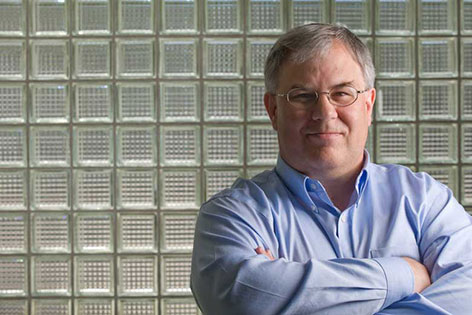 |
UC Irvine researchers identify key immune system process

Steve Zylius/UC Irvine Strategic Communications
Dr. Michel Demetriou says understanding T cell development may lead to new therapies for autoimmune diseases such as multiple sclerosis.
Study yields insight into delicate course of T cell creation
In the online version of Nature Immunology, neurology professor Dr. Michael Demetriou, postdoctoral scholar Raymond Zhou and other Institute for Immunology colleagues describe a critical mechanism underlying how T cells are created, selected and released into the bloodstream.
A T cell is a type of blood cell called a lymphocyte that protects the body from infection. T cell precursors called thymocytes are created in the bone marrow and migrate to the thymus — a walnut-sized organ at the base of the neck — where they turn into T cells.
However, very few thymocytes become fully functional T cells, and in the current study, the Demetriou team gained important new insights into why.
As they transform into T cells, thymocytes grow receptors that react to an antigen (any substance provoking an immune response) that’s bound to a small molecule called MHC. If this reaction is too strong or too weak, the thymocyte does not mature into a T cell.
Demetriou and the others found that the delicate balance determining the proper reactive ability is controlled by glycosylation, a process in which a sugar attaches to a target protein to give the protein stability and form. They saw that changes in the addition of sugars to receptors — including the blocking of glycosylation — during T cell development profoundly influenced how thymocytes reacted to the MHC-bound antigens and whether they became mature T cells.
Glycosylation also may help explain the creation of self-reactive T cells that escape from the thymus and can go on to attack the body’s own antigens, a process called autoimmunity that’s the basis of immune system disorders such as multiple sclerosis.
"Understanding how T cells are selected for antigen reactivity has been an enigma, and here we have made a major advance in understanding how this selection works," said Demetriou, a neurologist who specializes in multiple sclerosis.
The work, he added, represents a breakthrough in basic research and facilitates further discoveries about T cell processes that could someday yield new therapeutic approaches to infection and autoimmune diseases.
Haik Mkhikian, Ani Grigorian, Amanda Hong, David Chen and Araz Arakelyan of UC Irvine contributed to the study, which received support from the National Institute of Allergy & Infectious Diseases (grant R01 AI053331) and the National Heart, Lung & Blood Institute (grant F30HL108451).
Demetriou and the others found that the delicate balance determining the proper reactive ability is controlled by glycosylation, a process in which a sugar attaches to a target protein to give the protein stability and form. They saw that changes in the addition of sugars to receptors — including the blocking of glycosylation — during T cell development profoundly influenced how thymocytes reacted to the MHC-bound antigens and whether they became mature T cells.
Glycosylation also may help explain the creation of self-reactive T cells that escape from the thymus and can go on to attack the body’s own antigens, a process called autoimmunity that’s the basis of immune system disorders such as multiple sclerosis.
"Understanding how T cells are selected for antigen reactivity has been an enigma, and here we have made a major advance in understanding how this selection works," said Demetriou, a neurologist who specializes in multiple sclerosis.
The work, he added, represents a breakthrough in basic research and facilitates further discoveries about T cell processes that could someday yield new therapeutic approaches to infection and autoimmune diseases.
Haik Mkhikian, Ani Grigorian, Amanda Hong, David Chen and Araz Arakelyan of UC Irvine contributed to the study, which received support from the National Institute of Allergy & Infectious Diseases (grant R01 AI053331) and the National Heart, Lung & Blood Institute (grant F30HL108451).
— Tom Vasich, University Strategic Communications